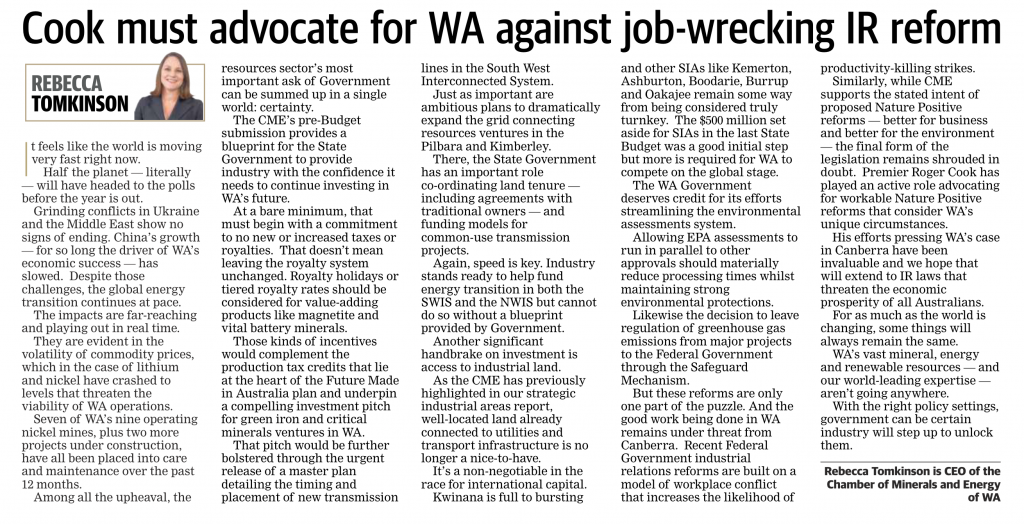
Article by Rebecca Tomkinson, courtesy of The West Australian.
It feels like the world is moving very fast right now.
Half the planet — literally — will have headed to the polls before the year is out.
Grinding conflicts in Ukraine and the Middle East show no signs of ending. China’s growth — for so long the driver of WA’s economic success — has slowed. Despite those challenges, the global energy transition continues at pace.
The impacts are far-reaching and playing out in real time.
They are evident in the volatility of commodity prices, which in the case of lithium and nickel have crashed to levels that threaten the viability of WA operations.
Seven of WA’s nine operating nickel mines, plus two more projects under construction, have all been placed into care and maintenance over the past 12 months.
Among all the upheaval, the resources sector’s most important ask of Government can be summed up in a single world: certainty.
The CME’s pre-Budget submission provides a blueprint for the State Government to provide industry with the confidence it needs to continue investing in WA’s future.
At a bare minimum, that must begin with a commitment to no new or increased taxes or royalties. That doesn’t mean leaving the royalty system unchanged. Royalty holidays or tiered royalty rates should be considered for value-adding products like magnetite and vital battery minerals.
Those kinds of incentives would complement the production tax credits that lie at the heart of the Future Made in Australia plan and underpin a compelling investment pitch for green iron and critical minerals ventures in WA.
That pitch would be further bolstered through the urgent release of a master plan detailing the timing and placement of new transmission lines in the South West Interconnected System.
Just as important are ambitious plans to dramatically expand the grid connecting resources ventures in the Pilbara and Kimberley.
There, the State Government has an important role co-ordinating land tenure — including agreements with traditional owners — and funding models for common-use transmission projects.
Again, speed is key. Industry stands ready to help fund energy transition in both the SWIS and the NWIS but cannot do so without a blueprint provided by Government.
Another significant handbrake on investment is access to industrial land.
As the CME has previously highlighted in our strategic industrial areas report, well-located land already connected to utilities and transport infrastructure is no longer a nice-to-have.
It’s a non-negotiable in the race for international capital.
Kwinana is full to bursting and other SIAs like Kemerton, Ashburton, Boodarie, Burrup and Oakajee remain some way from being considered truly turnkey. The $500 million set aside for SIAs in the last State Budget was a good initial step but more is required for WA to compete on the global stage.
The WA Government deserves credit for its efforts streamlining the environmental assessments system.
Allowing EPA assessments to run in parallel to other approvals should materially reduce processing times whilst maintaining strong environmental protections.
Likewise the decision to leave regulation of greenhouse gas emissions from major projects to the Federal Government through the Safeguard Mechanism.
But these reforms are only one part of the puzzle. And the good work being done in WA remains under threat from Canberra. Recent Federal Government industrial relations reforms are built on a model of workplace conflict that increases the likelihood of productivity-killing strikes.
Similarly, while CME supports the stated intent of proposed Nature Positive reforms — better for business and better for the environment — the final form of the legislation remains shrouded in doubt. Premier Roger Cook has played an active role advocating for workable Nature Positive reforms that consider WA’s unique circumstances.
His efforts pressing WA’s case in Canberra have been invaluable and we hope that will extend to IR laws that threaten the economic prosperity of all Australians.
For as much as the world is changing, some things will always remain the same.
WA’s vast mineral, energy and renewable resources — and our world-leading expertise — aren’t going anywhere.
With the right policy settings, government can be certain industry will step up to unlock them.
Rebecca Tomkinson is CEO of the Chamber of Minerals and Energy of WA
